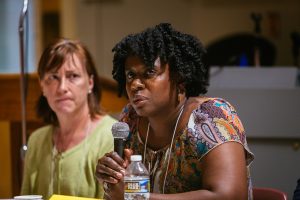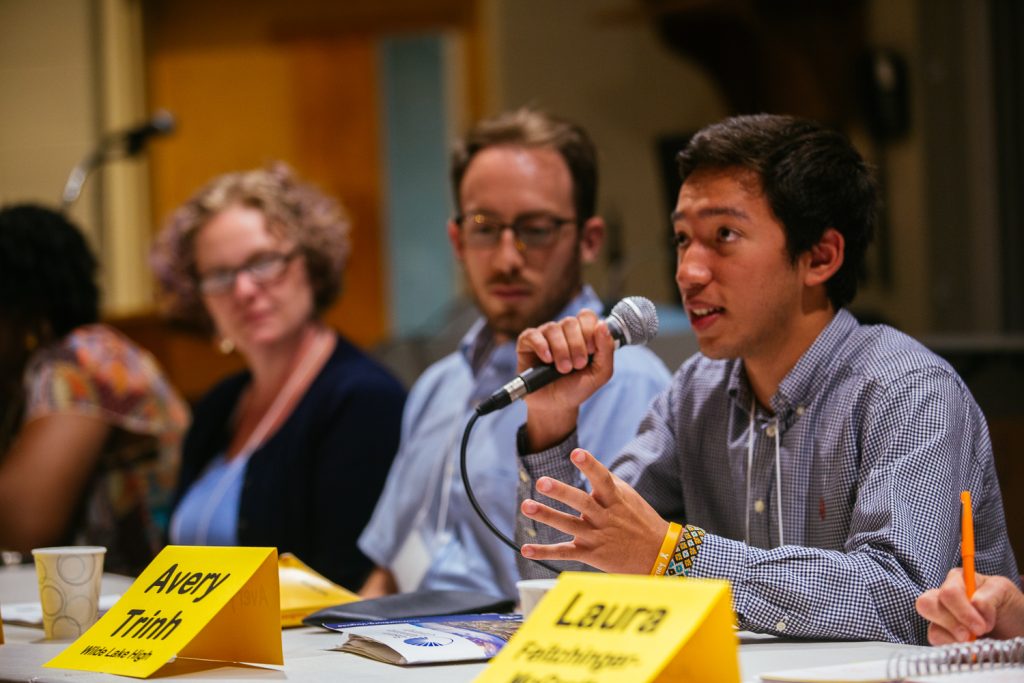What makes Avery Trinh’s endorsement of restorative justice in education special is that he’s not an administrator or a teacher. He’s a rising senior at Wilde Lake High School in Columbia, Maryland.
His interest in and support of restorative justice in education (RJE) brought him, for the second consecutive year, to Eastern Mennonite University’s Restorative Justice in Education Academy in late June.
This time, though, instead of just learning principles and theory, Trinh drew from his prior year’s experience conducting independent research to contribute to a culminating panel among teachers and administrators.
Trinh was one of five students to attend the academy along with approximately 90 teachers, administrators, and other educational staff from five states including Colorado, Maryland, New York, Virginia and West Virginia.
The goal of the second annual academy, hosted by the MA in Restorative Justice and MA in Education programs at EMU, was to provide the educational community with principles and practices to create just and equitable learning environments that foster healthy relationships and transform conflict.
The conference included skill- and knowledge-building sessions as well as reflective sessions. An evening showing of the film Resilience and panel conversation addressed the effects on young learners of “toxic stress” caused by childhood abuse and neglect.
“We build time into this academy for reflection on a teacher’s current practice and school culture, and how restorative justice might be implemented in that environment,” said Professor Kathy Evans.

Restorative justice, known as RJ for short, presents an alternative philosophy of justice that addresses the needs of multiple stakeholders, draws from indigenous and faith-based approaches, and challenges structural and interpersonal forms of harm. It’s used in a variety of settings, such as prisons and the justice system. RJ in education, which is also called RJE, has been used successfully in school districts to lower suspension rates and to create accountability and community in the schooling environment.
RJE principles and practices are much more than a response to harm, said Evans. They also nurture “relational, interconnected school cultures.”
That takes building community through cultivating respect, cultural awareness and responsiveness, and active listening, said EMU instructor Bob Garrity in his session about restorative discipline.
Those themes of community resurfaced again in the academy’s final afternoon session, where Trinh and other panelists agreed that restorative justice can bring together parents, teachers and students.
Laura Feichtinger-McGrath, an English as a Second Language coordinator for Harrisonburg City Public Schools, said, “We’re going to have less discipline issues as our students go through a community that cares about and honors them.”
Lea Murray, a science teacher at Kate Collins Middle School in Waynesboro, Va., said that teaching more restoratively led her to shift the focus of discipline from punishment to transformation, which has resulted in “amazing strides” in the sense of community in her classroom.
Additional panelists included:
- Jelisa Coltrane Wolfe, executive director of student services, Staunton (Va.) City Schools;
- Michelle Edwards, behavioral specialist, Spotswood Elementary School, Harrisonburg (Va.) City Public Schools;
- Erich Sneller, chemistry teacher, Harrisonburg High School, Harrisonburg City Public Schools.
First-time attender and veteran teacher Jeanie Dixon, of Roanoke City Public Schools, heard that community message loud and clear. Students’ voices must be empowered, she said: “They’re stakeholders, and we want them to want to be in school.”
Including the voices of administrators, teachers and students in a panel is an important part of the academy, Evans says. “RJE is all about relationships. To hear first-hand experiences helps both new and experienced RJE practitioners build their own relationship with the concepts and the students they hope to impact.”
Trinh, the high school student who shared his experiences with RJE on the panel, affirmed this importance of learning through relationships. His voice was that of an empowered and invested stakeholder. “I learn more from personal stories than I do from a book or article I read,” he said. “I’ve noticed how important it is to get to know people. It’s all about experiences.”
